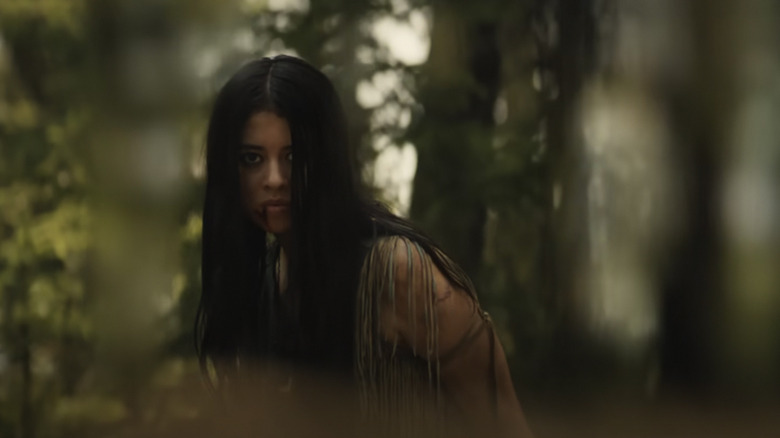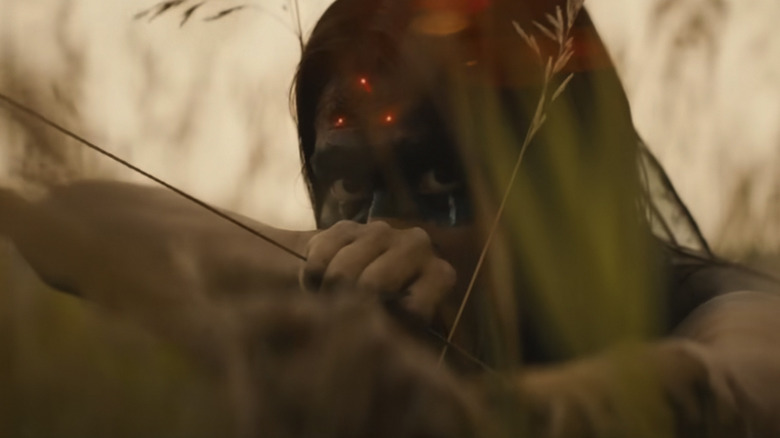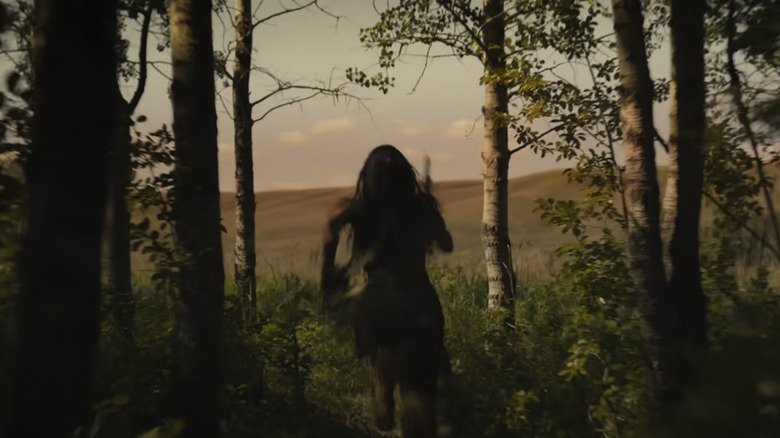Prey Trailer: A Comanche Woman Hunts A Predator; Dan Trachtenberg Tells Us About His Prequel
After director Dan Trachtenberg impressed us with his feature debut "10 Cloverfield Lane" back in 2016, we've been eagerly awaiting his next film. He's flirted with a few options for a follow-up, but largely spent his time directing episodes of shows like "The Boys" and "Black Mirror" while waiting for the right situation to the world of movies. Six years later, that time has finally come: He's behind the camera of "Prey," a "Predator" film set 300 years ago in which a skilled warrior named Naru (Amber Midthunder) comes face to (invisible) face with a terrifying alien hunter.
20th Century Studios has just released a new trailer for the film, and I had the opportunity to speak with Trachtenberg and producer Jhane Myers about inspirations for the project, the current state of IP filmmaking, and the cool language options this movie will offer to viewers at home. Check out the trailer and our conversation below.
Prey trailer
I love how this trailer grounds you in Naru's journey before revealing that she has a much bigger fight on her hands than the one she originally anticipated. Oddly, the trailer's structure sort of mirrors the public trajectory of this movie itself. This project was initially developed under the code name "Skulls" in the hopes of keeping the fact that it was a "Predator" movie under wraps, which would have been incredibly cool — but alas, the cat was let out of the bag. But hey, at least the marketing team now has access to all of the familiar iconography of a "Predator" project (the clicking sounds, the triangle-shaped laser sight, the hair tendrils) that will likely convince a much wider audience to click "play" on opening weekend.
Here's the movie's official synopsis:
Set in the Comanche Nation 300 years ago, "Prey" is the story of a young woman, Naru, a fierce and highly skilled warrior. She has been raised in the shadow of some of the most legendary hunters who roam the Great Plains, so when danger threatens her camp, she sets out to protect her people. The prey she stalks, and ultimately confronts, turns out to be a highly evolved alien predator with a technically advanced arsenal, resulting in a vicious and terrifying showdown between the two adversaries.
A conversation with director Dan Trachtenberg and producer Jhane Myers
Dan, there's been some discussion in recent years about how, because of the IP-obsessed nature of the industry, filmmakers are increasingly having to smuggle their ideas and interests into a larger property in order to get these stories told at all. I'm curious if that's been true in your experience, because with both this and "10 Cloverfield Lane," it almost feels like both of those are stories that start out as one thing and then eventually become part of a larger, more familiar world. Do you feel like that's an accurate assessment of how the industry is operating right now?
Trachtenberg: I think so. Frankly — I've mentioned this to some friends before — I think Marvel is more of a platform for movies than just a company that makes comic book movies. I think the way we are getting our heist movies and our road movies and our political thrillers are just through IP. One of the things that I've been searching for when I've dabbled in trying to develop stuff for an IP is like, "Is this movie awesome without the IP? Is this already a cool movie?" But not how do I smuggle it into the IP but more, with this one, does that make it even more awesome?
I was a little bit heartbroken when — this movie started out as a Fox thing, and then the merger happened and I didn't know that this could exist, could still happen. And I was thinking about, "Can we take this idea and make it non-IP?" But the themes of the movie, so much in the engine of this, is based on the IP, is stronger because of how the Predator functions and interacts with what our main character is going through. So to answer your question, yes, I think that is absolutely happening. I don't think that's the worst thing in the world. But I think what makes something great is when it feels like it's already an awesome idea, and then when it's connected to the IP that makes it even more special.
Jhane, I was wondering if you could tell me about the language in this movie. Is there a "Valkyrie"-esque moment in the beginning where the characters are speaking in a certain language and then it seamlessly transitions into English? How did you guys approach that?
Myers: Thank you for asking that question. That's really important to me being Comanche and working with our Comanche language department, also with working with Comanche language speakers. But just the fact that people will have a choice, the world will have a choice to listen to the whole film in Comanche is amazing.
Oh, wow.
Myers: That's never been done for my tribe, ever. There's only a couple of movies. I think "Star Wars," which was 30 years old when they transcribed it into Navajo, and then there was Navajo again for "Finding Nemo," which was 20 years old when they did that. But this is the first time for a brand new film to come out and have that option to hear it all in the whole language. So that not only inspires the young language speakers of my nation, but that inspires a lot of other people and shows them, and like I said, shows the world what our language is about. Which is thrilling for me.
Trachtenberg: To be specific, so in the movie, we did wrestle a lot with doing a "Hunt For Red October" thing. Ultimately never quite came up with any aggressive gimmick for it. But the movie was shot in English and Comanche, both languages are spoken, but when you hear English, it's as if it's Comanche. But what Jhane is speaking to is on Hulu, there will be a Comanche dub of the movie. So you can watch the entire movie in Comanche with the original actors returning to perform their roles.
Myers: Which is so cool. Hopefully, this happening at the beginning in this film will reset that paradigm for native language. So when other directors and people are producing films that have a native narrative, they'll go the whole mile and do the film in that language. When I first read the script I was so excited and I talked to Dan I'm like, "Dan, I can't wait to hear...!" Because I'm a big "Predator" fan, and I wanted [the Predator] to push that little language thing and get the Comanche language and then play it back. I thought that would be so cool, and that was in one of my first conversations with Dan, because that's just what popped into my head.
Cinematic influences
What movies were you looking at for inspiration here, Dan? I was curious if you saw the movie "Big Game" from around 10 years ago.
Trachtenberg: Sam Jackson?
Yep.
Trachtenberg: Never saw it. I remember the trailer and the poster. Maybe I should watch it now. Is it the director of the Santa Claus movie?
Yeah, "Rare Exports."
Trachtenberg: Yeah. No, never saw that. Inspiration, originally and conceptually, I was very driven to make something along the lines of "Fury Road" or "Gravity" that was very visual, as few words as possible, survivor story. But as we developed the movie, my cinematographer and I, visually, took a lot of inspiration from the Justin Kurzel "Macbeth" movie. There's a sequence, one that's a little bit in the trailer and that initial poster image we sent out in the burnt glade that takes a lot of visual inspiration from that movie. Those were the biggies. And then sports movies. Stuff like "Rudy" and "Rocky" and any underdog story, I could not have referenced enough — especially in editorial as we were shaping more of the story. That was all we talked about.
"Prey" premieres on Hulu on August 5, 2022.


